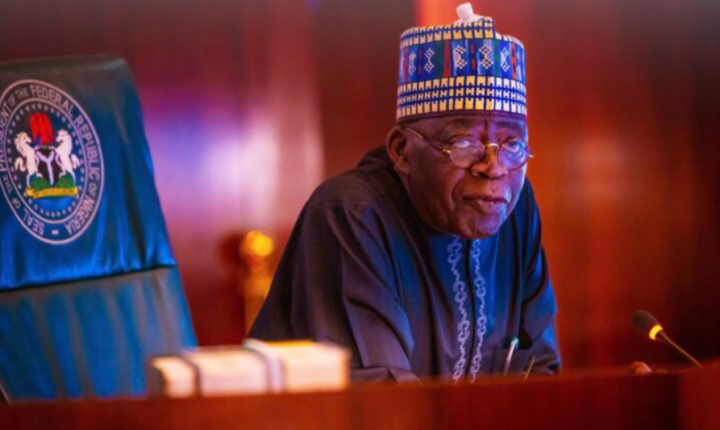President Bola Ahmed Tinubu has commissioned a 40,000 cubic meter Liquefied Petroleum Gas (LPG) vessel built for the West Africa Gas Limited (WAGL), a joint venture between the Nigerian National Petroleum Company Limited (NNPCL) and Sahara Group, in Ulsan, South Korea. The new carrier, which represents one of the most significant investments in Nigeria’s gas infrastructure, is expected to bolster the country’s energy transition plan and deepen its LPG penetration across Africa.
The state-of-the-art carrier, named Akintoye 1, was built by Hyundai Heavy Industries, one of the world’s leading shipbuilders, and is part of a larger initiative to increase Nigeria’s participation in global gas value chains. Officials say the commissioning underscores Nigeria’s growing focus on cleaner energy sources and reflects President Tinubu’s administration’s determination to leverage natural gas as a transitional fuel for sustainable economic growth.

Represented by the Minister of State for Petroleum Resources (Gas), Ekperikpe Ekpo, the President said the commissioning of the vessel signals a new chapter for Nigeria in the international gas market. He explained that the initiative is aligned with his government’s “Decade of Gas” agenda, which prioritises the expansion of gas infrastructure, domestic gas utilisation, and foreign exchange earnings from gas exports.
“Today, we are not only celebrating the commissioning of a vessel but also Nigeria’s ambition to become a regional hub for gas distribution. With this milestone, we are demonstrating our capacity to provide cleaner, cheaper, and more reliable energy to our people while also creating a competitive space for Nigeria in the global LPG market,” Tinubu said.
The President reaffirmed his administration’s commitment to supporting public-private partnerships that drive investment in the energy sector, noting that the collaboration between NNPCL and Sahara Group is a clear example of how synergies can accelerate progress. He also praised the partners for their foresight and resilience in delivering a project of such scale despite global economic headwinds.
Group Chief Executive Officer of NNPCL, Mele Kyari, said the vessel marks a major stride in Nigeria’s efforts to reduce dependence on imported refined fuels while promoting indigenous capacity. According to him, the LPG carrier will not only enhance Nigeria’s capacity to transport gas but also guarantee supply security to meet rising domestic demand.
“The commissioning of this vessel is part of a bigger picture. We are working to unlock the full potential of our vast gas reserves, and this investment is a step towards ensuring energy affordability, sustainability, and accessibility for all Nigerians,” Kyari stated.
On his part, Sahara Group’s Executive Director, Temitope Shonubi, described the project as a testament to what can be achieved when private and public entities collaborate towards a shared vision. He said the vessel would serve as a strategic asset for West Africa and contribute to reducing the carbon footprint associated with traditional energy sources.
Industry analysts believe the development will improve Nigeria’s logistics capacity for LPG distribution, a critical step in deepening adoption of cooking gas and reducing reliance on biomass fuels. Data from the Nigerian Midstream and Downstream Petroleum Regulatory Authority (NMDPRA) show that LPG consumption in Nigeria has been rising steadily, with over 1.3 million metric tonnes consumed in 2023. However, supply chain constraints and infrastructure gaps remain major challenges.
By deploying a modern LPG carrier, NNPCL and WAGL aim to ease these challenges, expand distribution channels, and bring Nigeria closer to its target of achieving 5 million metric tonnes of LPG consumption annually by 2030.
The vessel is also expected to enhance regional trade, as it will facilitate the supply of LPG to other West African nations struggling with energy access. Experts say this will not only promote energy integration across the region but also open new revenue streams for Nigeria, especially at a time when the government is working to diversify its foreign exchange sources.
President Tinubu, while commending Hyundai Heavy Industries for the successful completion of the project, urged more global investors to look towards Nigeria for viable opportunities in the gas sector. He noted that the country’s vast reserves of over 200 trillion cubic feet of natural gas position it as a strategic player in the global transition towards cleaner fuels.
The President further assured that his administration is implementing policies to provide a stable investment climate for both local and international partners. These include reforms in pricing frameworks, incentives for gas infrastructure development, and measures to tackle regulatory bottlenecks.
The commissioning ceremony was attended by senior government officials, representatives of the South Korean government, NNPCL executives, Sahara Group management, and international energy stakeholders.
With the launch of the 40,000 CBM vessel, Nigeria is poised to strengthen its presence in global gas markets, reduce domestic energy poverty, and reinforce its commitment to sustainable development. Observers believe this milestone could be the beginning of a new wave of energy infrastructure projects that will reshape Nigeria’s economic landscape in the coming years.
Support InfoStride News' Credible Journalism: Only credible journalism can guarantee a fair, accountable and transparent society, including democracy and government. It involves a lot of efforts and money. We need your support. Click here to Donate
